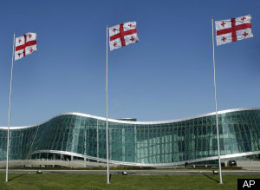 The Associated Press:
The Associated Press: Tbilisi, Georgia — Georgia's government on Friday announced the arrests of 13 people, including six military pilots and four Russian citizens, who are accused of spying for Russia's armed forces.
The arrests provoked an angry response from Russia's Foreign Ministry, which accused Georgian President Mikhail Saakashvili of suffering from "chronic spy mania" because of his antipathy toward Russia.
A series of spy flaps in recent years has aggravated already tense relations between the two former Soviet republics, which fought a brief but bitter war in 2008.
The arrests, which took place in October, were announced on the day Russia's military intelligence agency celebrates its professional holiday, Day of the Military Intelligence Officer.
Georgia's Interior Ministry said its counterintelligence department had succeeded in planting its own agent, a former Soviet army officer, into the military intelligence agency, known by its Russian initials, GRU.
The operation led to the exposure of dozens of people working covertly for GRU and the arrests of 15, the ministry said. Two were released under a plea-bargain agreement.
The Georgian citizens arrested included six air force pilots, a naval radio operator accused of passing on secret military codes and the founder of a non-governmental group called the Globalization Institute. Most are accused of providing Russia with information about Georgia's combat readiness.
The four Russian citizens were identified as Armen Gevorkian and Ruben Shikoian, both ethnic Armenians who are the director and deputy director, respectively, of the Georgian office of Saybolt, a Netherlands-based company that provides a range of services in oil, gas and chemical industries; businessman Pyotr Devrishadze and Yury Skrylnikov, described as a liaison with Russian military intelligence.
The chairman of the international affairs committee in the Russian parliament's lower house, Konstantin Kosachyov, said they had no links to the special services. Kosachyov, who frequently serves as a Kremlin mouthpiece, warned Georgia that Russia was "always ready to protect its citizens with all available means."
Russia justified sending troops into South Ossetia in August 2008 by proclaiming its obligation to protect Russian citizens. Many residents of the separatist Georgian republic had been given Russian passports ahead of the conflict.
Russia's Foreign Ministry condemned the arrests but did not directly deny any intelligence links.
"In recent years the Georgian leadership has repeatedly resorted to the fabrication of such scandals, cynically hoping to receive domestic or foreign dividends," it said.
The ministry said the arrests were aimed at damaging Russia's relations with the West ahead of two summits: the meeting of the NATO-Russia Council in Portugal and the Organization for Security and Cooperation in Europe's meeting in Kazakhstan.
A video released by Georgia's Interior Ministry shows one of the Russian citizens, Devrishadze, explaining how he was recruited in 2006. He said he was having trouble with his business in Moscow at the time, and a Russian Embassy official in Tbilisi offered to help and set up a meeting for him in Moscow. At the meeting he was told his business would be closed down and he could be arrested unless he agreed to cooperate.
Otar Ordzhonikidze, deputy chief of Georgia's counterintelligence department, said the operation to round up the accused spies began in 2006, when the Interior Ministry offered an amnesty to anyone who voluntarily admitted to having worked for foreign intelligence services. Information provided by some of the people who accepted the amnesty eventually led to the latest round of arrests.
Also in 2006, four Russian officers based in Georgia were arrested and charged with working for Russian military intelligence. Russia, which at the time still maintained troops in Georgia, was outraged and recalled its ambassador.
The officers were soon handed over, but Russia continued to strike back. All travel links with Georgia were cut, police began raiding Georgian businesses in Moscow, and some Georgians living in Russia were deported.
More arrests on espionage charges have followed on both sides.
In March 2010, a Russian military court convicted a Georgian and two former Russian military officers of spying for Georgia.
Ordzhonikidze said about 60 people have been arrested in Georgia on suspicion of spying for Russia in the past six years.
No comments:
Post a Comment
Note: Only a member of this blog may post a comment.